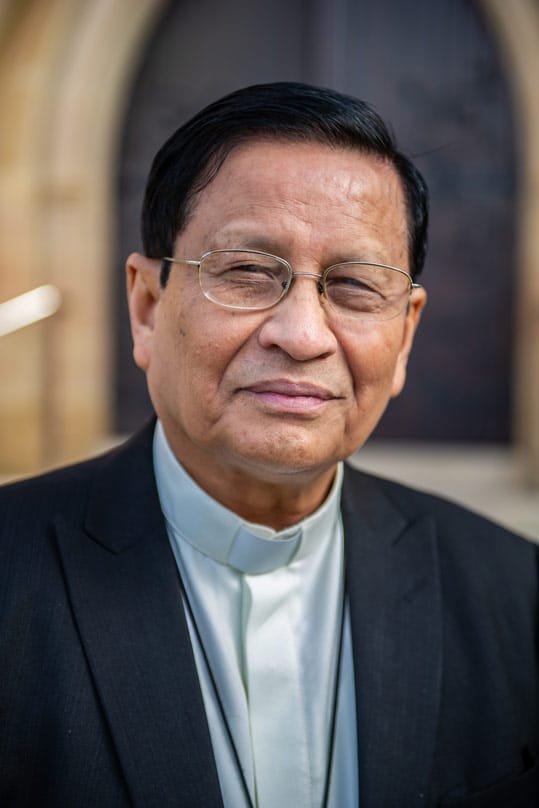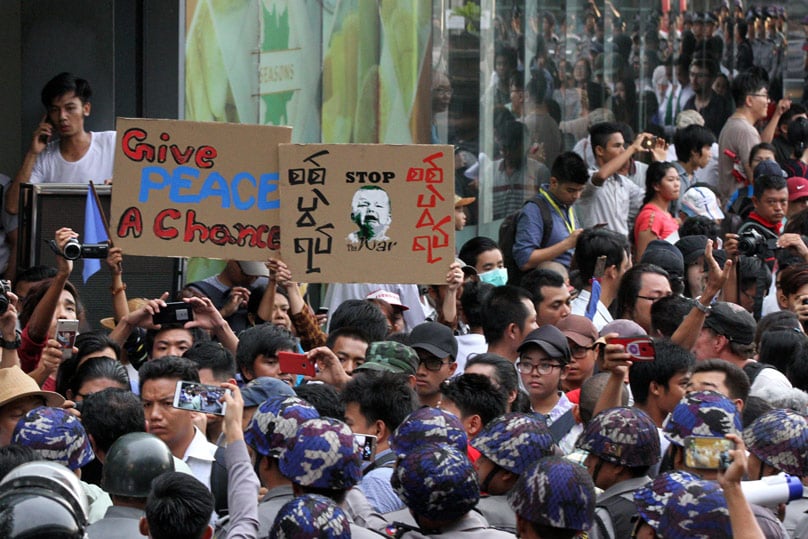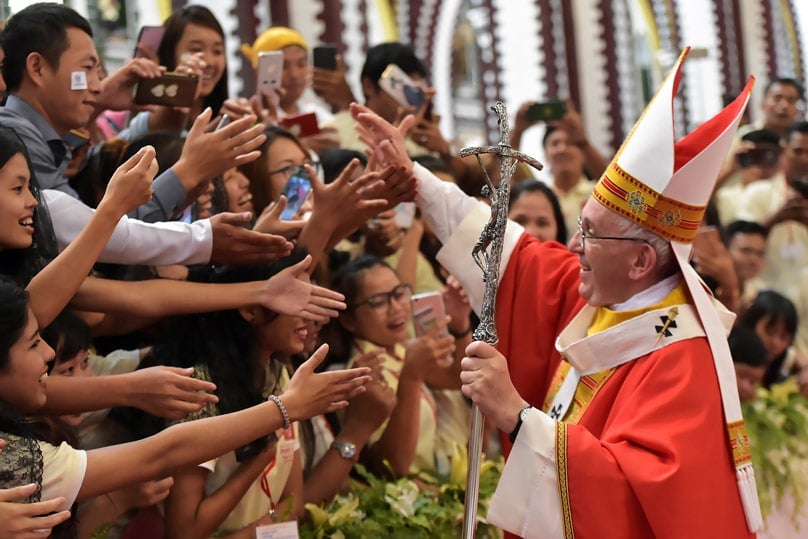
More than 60 years of military rule and the world’s longest civil war have not destroyed the spirit of the Catholic faithful in Myanmar, says Cardinal Charles Muang Bo.
Now their leaders are playing a pivotal role in rebuilding the strife-torn country.
His country’s only cardinal and the archbishop of Yangon, its largest diocese, he is a tireless campaigner for peace and reconciliation in his homeland, has decried recent abuses against the Rohingya, and called for a nationwide ceasefire.
The cardinal visited Sydney this month at the invitation of Catholic Mission, whose major appeal this year will fund education programs backed by Cardinal Bo.
Foreign aid and religious missionaries, intellectuals and highly skilled workers where either expelled or fled the predominantly Buddhist country when the military took power in 1962.
Hospitals, schools, and other institutions were nationalised and become impoverished.

Despite a proud history and rich natural resources Myanmar (formerly Burma) is today listed as one of the world’s least developed nations.
Hopes were high when Nobel laureate Aung San Suu Kyi’s National League for Democracy party won the first multi-party elections in 2015.
The task of embedding democracy in a country with 135 ethnic minorities, long-running internal conflicts, and a military that still holds the balance of power, was difficult enough.
Then in 2015 military crackdown against Muslim minorities in Rakhine state – the Rohingya – drove more than 600,000 of them into neighbouring Bangladesh; drawing claims of genocide and ethnic cleansing, and a backlash against Aung Suu Kyi from the international community.
But the cardinal is encouraged by every glimmer of hope he can find.
“We cannot live in despair,” he said.
“I received this optimism from the time that I was a young boy educated by the Salesians.
“Especially in difficult and unfavourable circumstances, to have full confidence in God’s providence and God’s way of love and mercy, that helps us to go forward.”

His conversation with The Catholic Weekly covered the work of the Church in Myanmar in education and interfaith dialogue, the Rohingya crisis and civil war, and his warm respect for Aung San Suu Kyi who he believes needs all the support she can get.
Catholics in Myanmar
During the military dictatorship the Church’s dioceses grew from two to 16 while the number of Catholics doubled.
There are 800,000 Catholics in Myanmar, many from remote ethnic regions.
“While Catholicism has a 500-year history in Myanmar we are still a minority, but recently we have had many more join the Church, individually or with their family,” the cardinal said.
“Sometimes in the more remote areas when the head man is ready then the whole village is baptised.”
The visit of Pope Francis last year was a great success, he said.
“We have become more respected and well-known especially by the Buddhist community and in the remote villages.
“His visit was very effective in the sense that he came with a consistent message of love and peace. He met the civil authorities, diplomats, Aung San Suu Kyi, military personnel, young people, Buddhist monks and so on.
“He left a lot of work for us to follow up on.”
The Church, while it represents 1.3 percent of the population of 53 million people, has a unique position and thus, he believes, a responsibility to try to broker peace and rebuild the country.
Most of the Catholics and almost all the bishops come from the ethnic minorities, and the Church has never come into conflict with the Buddhist majority, the Muslims or any of the other religious, he said.
“We’re very respected as a peaceful people who try to work for harmony in our dioceses, and whatever we do is for the benefit of everyone without discrimination of race or religion.”
However, in Kachin where Christians are fighting the military for self-determination and control of resources, some are Catholic while the vast majority are Baptist.
Education
The cardinal believes that a dearth of quality education in Myanmar is one reason its civil war has lasted so long.
For years the country has been stuck with a rote-learning system that inhibited critical thinking.
But with the help of Catholic Mission the Church is constructing or renovating five schools, beginning with preschool to grade 1 which will employ the Montessori method.
“It’s just the first step, but with this little beginning we have we hope to continue their education from middle school to high school.”
A decade ago, Cardinal Bo founded a teacher-training centre called the Pyinya Sanyae Institute of Education (PSIE)
“Eventually, the vision is to also offer universities and colleges with the help of the international community,” he said.
He knows education will also help to halt the migration, trafficking, and slavery of Myanmar youth. There’s a personal side to his commitment. He was educated by the Salesians when his family was impoverished after the death of his father.
Interfaith dialogue
Last year’s escalation of the conflict in Rakhine state between the Muslims and Buddhists made the government value the role of the religious leaders in promoting peaceful co-existence.
“I have been trying to promote interreligious dialogue for many years to no effect, but now because of the Rohingya case it is becoming a reality,” he said.
Last month the cardinal arranged an urgent meeting of his country’s bishops with Pope Francis and was part of an interreligious meeting for peace in Myanmar held in Rome, along with Buddhist, Muslim, Hindu, and other Christian leaders from Myanmar and across the region.
They committed to working with the government and other groups working to achieve a nationwide ceasefire agreement and sustainable peace with a vision of a democratic federal system in the country.
“Afterwards Aung San Suu Kyi told us she will need to rely very much on the religious leaders to animate the people to work for peace.”
The Rohingya
The cardinal, with other religious, government and civil leaders recently toured the Myanmar-Bangladesh border to see several places where the Myanmar government is preparing to repatriate the refugees.
In total, there are 2 million Rakhine Muslims in Bangladesh, nearly 700,000 from last year alone, and less than a dozen have returned to their former home.
“Everything is set and ready, with temporary shelters and paperwork so they can claim citizenship.
“So they are not stateless people as the international media says. The government says it depends on them whether they return or not, but that it is ready to receive them.
“But from the side of these people in Bangladesh they want to wait and see whether they can return with dignity and safety.”
There are other factors at play, including that the cardinal suspects Bangladesh, happy with the current flow of aid to help the refugees, is encouraging them to stay.
“But we fear that once the assistance is all dried up then those people will be still again be left out.
“We also suspect some of them are hoping to go on to richer countries, so it is a complex situation.”
The cardinal also says it is “difficult to say” that what happened last year was an attempt at genocide.
“The Rohingyas said that during that conflict 4000-5000 people were killed, but as Aung San Suu Kyi says where is the proof? Where is the mass grave? There were certainly many people killed, but not this many.
“We could see ourselves by helicopter the spots where the villages where there, perhaps burnt down, they say by the military, but there are also rumours that before they went to Bangladesh they burnt their own houses.
“The opinion in the country is very much divided.”
He advised Pope Francis to not use the word ‘Rohingya’ during his visit to Myanmar as it’s a politically-loaded name the Rakhine Muslims use for themselves, he says.
He was concerned that any good done through the visit not be undermined by further violence.
“My personal worry is that there’s a long history of deep antagonism between these two groups which can inflame at any time. Currently there’s a problem with hate speech and preaching against Muslims spread on social media that has a very big impact on the simple people.
“But with the help of education and understanding of each other and a lot of patience from both sides we may be able to resolve that.”
He is heartened by the fact that the parliament is preparing to pass legislation against hate speech on the basis of a person’s religion or ethnic culture.
Message for Australia
Apart from gratitude for assistance with Myanmar’s nation-building efforts, the cardinal says it’s important to know its most intense difficulties are not only in the Rakhine state but also the civil war in the Kachin and Shan states.
He is also calling for support of his friend Aung San Suu Kyi, saying condemnation of her for silence on the Rohingya is fuelled by international media which doesn’t understand the situation in Myanmar.
“People have unrealistic expectations of Aung San Suu Kyi,” he said.
“Things are more opened and relaxed but it’s impossible to build a democracy from nothing, no rule, no law, no principals, overnight.
“She is not the only leader, according to the constitution written by the military, which retains the right to rule in the case of any emergency, and up to 35 percent of the parliamentary members are military personnel, also they control the ministries of defence and home affairs as well as the borders.
“So her power is very limited and she plays a delicate role but at this moment I believe that she is the only person who is capable of leading the country to democracy.”
